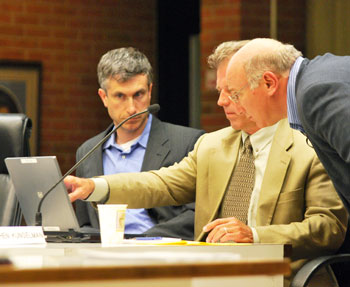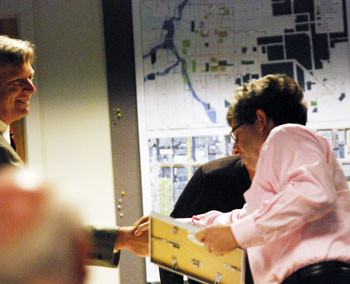Ann Arbor city council meeting (June 4, 2012): Transportation was the dominant theme of the meeting, as the council took action on items related to the possible development of a new train station in Ann Arbor. The council also took another step toward a possible transition of the Ann Arbor Transportation Authority to a geographically wider governance and service area.

From left: Christopher Taylor (Ward 3), Stephen Kunselman (Ward 3), and city of Ann Arbor transportation program manager Eli Cooper. (Photos by the writer.)
First, the council accepted the award of a roughly $2.8 million federal grant to help fund a site-alternatives analysis for possible construction of a new train station. That analysis is meant to result in the confirmation of a locally-preferred alternative to be reviewed by the Federal Rail Administration.
The grant requires a local match of roughly $700,000, which the city expects to make with funds it has already expended – in connection with the Fuller Road Station project, before the University of Michigan withdrew its participation earlier this year. Mike Anglin (Ward 5) and Jane Lumm (Ward 2) voted against accepting the grant.
One of many concerns expressed by Lumm was that the study would not be conducted starting with a “clean sheet,” which city transportation program manager Eli Cooper acknowledged was the case. But Cooper observed that starting with a clean sheet would mean wiping away previous work that had already been done.
Some of that work has been completed by SmithGroup JJR. At its June 4 meeting, the council also approved a $196,192 amendment to an existing contract with the firm – for further site analysis, funded by the new federal grant. Partly on the basis of a perceived conflict of interest by SmithGroup JJR in conducting the current work – given that it had done the previous work on site analysis – Lumm and Anglin also voted against that contract amendment as a two-person minority.
Lumm and Anglin were joined by Stephen Kunselman (Ward 3) in voting against a revised agreement among four parties that establishes a framework for possibly creating a larger transportation authority. The four parties to the agreement are the cities of Ann Arbor and Ypsilanti, Washtenaw County and the Ann Arbor Transportation Authority. In conjunction with reconsidering the four-party agreement, the council also approved articles of incorporation for the new Act 196 transit authority that would eventually need to be filed by Washtenaw County – on request from the AATA – in order to establish a new governance structure.
The council had previously approved the four-party agreement on March 5, 2012. The need for the Ann Arbor city council to reconsider the documents arose after the Ypsilanti city council amended those documents before approving them on May 15. On a unanimous vote, the Ann Arbor city council accepted only those amendments made by the Ypsilanti city council that affected the city of Ypsilanti. The Ann Arbor council majority gained one vote from its 7-4 approval of the agreement in March – Marcia Higgins (Ward 4) switched her earlier position and voted for it. The following day, on June 5, the Ypsilanti city council reconsidered and adopted the version of the four-party agreement that had been approved by the Ann Arbor council.
The result of the action by the two councils is an agreement that the cities will treat their transit taxes differently with respect to a municipal service charge. The city of Ann Arbor will impose the charge and keep roughly $90,000 that would otherwise go to the new transit authority, while Ypsilanti will forward an estimated $3,000 to the new transit authority, rather than applying that charge.
The four-party agreement will next be formally considered by the Washtenaw County board of commissioners – first at a June 14, 2012 working session. It now appears almost certain that the final ratification of all parties to the agreement will not occur with sufficient lead time for a countywide transit millage to be placed on the November 2012 ballot.
In other transportation-related action – affecting pedestrians – the council gave final approval to a revision to the city’s sidewalk repair ordinance. The ordinance revision relieves property owners of responsibility for sidewalk maintenance, during the five-year period of the millage that voters approved for that purpose in November 2011. The revision also provides a mechanism for the Ann Arbor Downtown Development Authority to pay for sidewalk repairs within its geographic district.
In other business, the council gave final approval to new water, sewer and stormwater rates. It also revived a previous requirement that it had rescinded last year – that a construction utility board (CUB) agreement be signed with the Washtenaw County Skilled Building Trades Council as a condition of award for city construction contracts. The council had rescinded the requirement in deference to a law enacted by the Michigan legislature, but a federal court has since enjoined against enforcement of that law.
In some of its other action items, the council formally made a change in the composition of the Elizabeth Dean tree fund, and authorized two street closings for the Sonic Lunch summer music series in Liberty Plaza. The council also heard public commentary on a range of topics, including a proposed warming center for the homeless. [Full Story]





